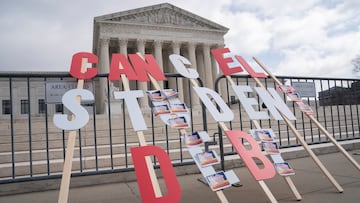FINANCE
What have the Supreme Court Justices said about Biden’s Student Loan Forgiveness program?
President Biden campaigned on a platform of widespread debt relief for borrowers but it has been blocked after persistent legal challenges.

The Supreme Court has ruled against the legality of President Biden’s Student Loan Forgiveness plan, his flagship programme to eliminate hundreds of billions of dollars in student debt.
The Court currently holds a 6-3 conservative majority and voted along their party lines, despite being nominally unbiased.
Student loan repayments were first put on hold at the start of the pandemic in 2020 and are yet to resume, with the final moratorium ending at the end of August. The total debt stands at around $1.8 trillion.
What did the justices say about Student Loan Forgiveness?
Chief Justice John Roberts voted against the plan and delivered the majority opinion. He said Education Secretary Miguel Cardona has the authority to “waive or modify” the HEROES Act, but not “rewrite that statute from the ground up.”
What is the HEROES Act?
The HEROES Act, formally known as the Health and Economic Recovery Omnibus Emergency Solutions Act, was introduced in May 2020. It was intended as a follow-up to the CARES Act, which was passed earlier in response to the pandemic.
The bill proposed a comprehensive package to address various aspects of the crisis, including public health, economic relief, and support for state and local governments. Key provisions of the bill sought to address the student debt crisis.
“The Secretary’s comprehensive debt cancellation plan cannot fairly be called a waiver; it not only nullifies existing provisions, but augments and expands them dramatically. It cannot be mere modification, because it constitutes ‘effectively the introduction of a whole new regime,’” Roberts wrote.
Roberts’ vote was joined by Associate Justices Clarence Thomas, Samuel Alito, Neil Gorsuch, Brett Kavanaugh and Amy Coney Barrett.
Voting for debt forgiveness, the three liberal judges Elena Kagan, Sonia Sotomayor and Ketanji Brown Jackson noted their dissent through Kagan.
“The plaintiffs in this case are six States that have no personal stake in the Secretary’s loan forgiveness plan,” she wrote. “They are classic ideological plaintiffs... In giving those States a forum, in adjudicating their complaint, the Court forgets its proper role. The Court acts as though it is an arbiter of political and policy disputes, rather than of cases and controversies.”






